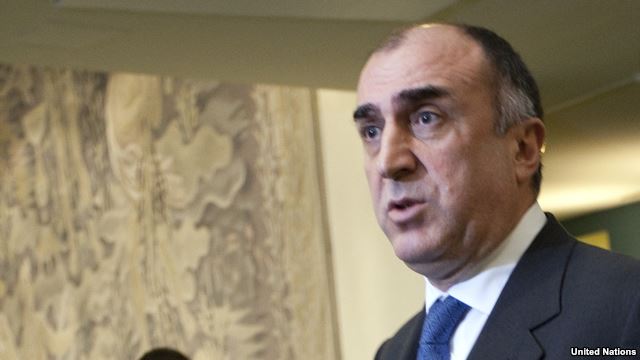
The EU-Azerbaijan Relationship: Current Status and Future Outlook
Publication: Eurasia Daily Monitor Volume: 12 Issue: 207
By:

On October 27, in Baku, representatives of the Council of Europe and the European Union presented several new projects to be implemented in the six Eastern Partnership (EaP) countries—Belarus, Ukraine, Moldova, Georgia, Armenia as well as Azerbaijan. The two European organizations have allocated 4.7 million euros ($5.1 million) for the realization of four of these projects within Azerbaijan itself. These are aimed at improving media freedom, building up capacities to fight and prevent corruption in administrative bodies, increasing the role and capacity of the Academy of Justice and training judges, as well as enhancing the efficiency and quality of judicial services in Azerbaijan. The head of the EU delegation to Azerbaijan, Ambassador Malena Mard, noted that the European Union is proud to work with Azerbaijan within the framework of these projects (Trend, October 27).
However, relations between the EU and Azerbaijan are, in reality, quite a bit more tense at the moment. Disagreements in the areas of deep and sustainable democracy, human rights, and fundamental freedoms are at the core of the current dissatisfaction. After various human rights groups and journalists’ organizations condemned Azerbaijan’s government for the jail sentences given to a number of media and civil society representatives on what they consider to be trumped-up charges designed to stop their everyday activities, the situation has deteriorated further. Anti-Azerbaijani rhetoric driven by the European media has also had a negative impact on this process. Baku responded to this criticism by noting that a tendentious approach like intervention in and pressure on the investigation, as well as attempts to politicize it even as charges against certain individuals were still under review are a direct violation of Azerbaijan’s sovereignty (News.az, September 2).
When, on September 10, the European Parliament adopted a tough resolution on Azerbaijan—2015/2840 (RSP)—with 365 votes in favor, 202 against and 72 abstentions (Europarl.europa.eu, September 9), relations reached a nadir. This resolution calls for negotiations on a Strategic Partnership Agreement with Azerbaijan to be immediately put on hold, until Baku takes concrete steps to advance domestic respect for universal human rights. The resolution also demands targeted sanctions as well as the suspension of issuing visas to Azerbaijani officials and even judges.
However it should be emphasized that resolution 2015/2840 (RSP)—adopted via a special non-legislative procedure—was not supported by all 751 members of the European Parliament, but mostly by the political left (S&D, GUE-NGL, ALDE and the Greens); the center-right European People’s Party (EPP), the largest political group in the European Parliament voted against it. The chairman of the Foreign Relations Committee, German member of the European Parliament Elmar Brok (EPP) also alleged “a violation of the rules of procedure, as the issue should have first been discussed in the committees, before being brought to the plenary session” (EurActiv, October 5).
The reaction of the Azerbaijani government to this resolution was prompt and extremely negative. The following day, on September 11, the European External Action Service (EEAS—the EU diplomatic service) delegation’s visit to Azerbaijan was abruptly postponed. The EEAS delegation had been scheduled to arrive in Azerbaijan the next week to discuss the proposed “Strategic Modernization Partnership” agreement between Brussels and Baku. Moreover, the Azerbaijani parliament called an extraordinary plenary session and passed a resolution suspending its activities with the Euronest Parliamentary Assembly (a joint forum of delegates from the European Parliament and legislatures of the six Eastern Partnership countries) (Fineko/abc.az, September 14). In a press conference with his Turkish counterpart, Ferudun Siniroglu, Azerbaijani Foreign Minister Elmar Mammadyarov declared: “Azerbaijan is an independent and sovereign country. There is no way a sovereign country could accept political pressure and dictate” (APA, September 16).
The speaker of the Azerbaijani parliament, Ogtay Asadov, attributed the EU’s pressure on Baku to the latter’s refusal to join sanctions against Russia (APA, October 26). Whereas, Azerbaijani Deputy Foreign Minister Mahmud Mammadguliyev alleged that “the Armenian lobby, as well as other forces [may] stand behind such activities of the European Parliament.” Nonetheless, Mammadguliyev believes that the harsh resolution on Azerbaijan adopted by the European Parliament in September does not correspond to the spirit of relations between the two sides: “Azerbaijan and the EU need each other, and their relations will be restored after some time,” he predicted (Trend, October 2).
Certainly, today the EU remains Azerbaijan’s main trading partner, accounting for 52 percent of its trade turnover (EurActiv, March 6). And as an energy producer and prospective future transit state, Azerbaijan also plays a strategic role in the EU’s energy security. In 2014, Azerbaijan exported 35 million tons of oil, of which 24.5 million tons were produced by the State Oil Company of Azerbaijan (SOCAR). Half of SOCAR’s exports, last year, were sold to consumers in Europe—especially to refineries in Spain, Italy, Germany, Poland and the Czech Republic (Abc.az, October 23). In addition, after the construction of the Southern Gas Corridor, Azerbaijani natural gas will start being pumped directly to European markets while bypassing Russian territory. Scheduled for completion before the end of this decade, the Southern Gas Corridor promises to significantly strengthen the EU’s energy security by diversifying both transit routes and suppliers—key goals of the European Union’s energy security strategy (Eur-lex.europa.eu, May 28, 2014).
Needless to say, a new workable framework has yet to be elaborated to better reflect the current realities in the EU-Azerbaijan relationship. Fuad Isgandarov, Azerbaijan’s ambassador to Belgium, has argued that since Azerbaijan is not keen on being associated with the EU, it should not be scrutinized in the same way as countries looking to become full members (EurActiv, March 6). This and other pragmatic suggestions will likely have to be carefully examined by both sides in order come up with a new middle ground to revive the EU-Azerbaijan relationship in the future.




